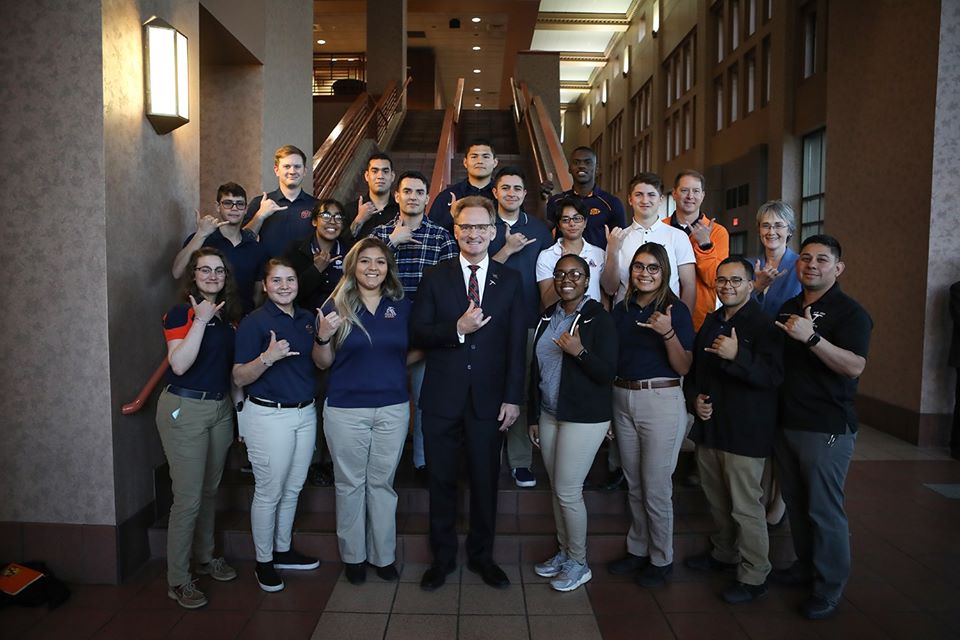Acting Secretary of the Navy Urges Healthy Skepticism During Centennial Lecture at UTEP
Last Updated on January 29, 2020 at 12:00 AM
Originally published January 29, 2020
By Julian Herrera
UTEP Communications
Thomas B. Modly, the Acting Secretary of the Navy, emphasized the importance of a discerning mind Tuesday, Jan. 28, 2020, while delivering the first Centennial Lecture of the year at The University of Texas at El Paso's Undergraduate Learning Center.

Modly — who has been serving as Acting Secretary since November 2019 — said UTEP is an integral component in the nation’s collective chase of discovery and innovation.
“The strength of this country has always been the curiosity and creativity in the relentless pursuit of truth that resides at the heart of a college education,” Modly said. “I can say that this University has a strong component of all three of those virtues here, and they’re alive and vibrant.”
Throughout his address, Modly expressed the importance of skepticism in U.S. education and ideology. He said the desire to understand the importance of knowledge acquisition contributes to the development of innovative minds.
“Skepticism [means] not accepting all things at face value, challenging conventional thinking, rejecting incrementalism — and, when more dramatic change is needed, rejecting it forcefully,” Modly said.
He recalled a quote that highlights the constructive skepticism that he encouraged: “The true meaning of the word skepticism has nothing to do with doubt or disbelief or negativity, but the process of applying reasoning and critical thinking to determine validity. It’s the process of finding a supporting conclusion, not the justification of a preconceived conclusion.”
Modly addressed the audience and implored them to recognize the significance that an individual has in perpetuating unity and solidarity.
“Each of you in this audience has a role to play in pushing our nation closer to that perfect union that our founders envisioned and sustaining this special republic we have, wherever your careers may take you,” he said.
Modly has dedicated much of his career to the development of an agile and accountable department, in the process creating the Office of the Chief Management Officer and the Business Operations Plan that recovered millions in property and increased readiness. Modly, in company with a blue-ribbon panel of national-level leaders, embarked upon a comprehensive reformation and prioritization of naval education.
“As we approach the cognitive era, defense will be defined more accurately by the power of this broader ecosystem that we create between government, industry, academia, and our partners around the world,” Modly said. “We are entering a space where information is power, and information is going to translate into more fighting capability.”
Modly used a portion of his address to tell the story of Doris Miller, the first African-American enlisted sailor to be awarded the Navy Cross. The Navy will name an aircraft carrier after Miller to honor the commitment and sacrifice that he made in the defense of what we define as the American ideal and spirit. The future USS Doris Miller will enter service in the early 2030s.
Modly asserts that the foundation of the United States lies in its choice to maintain an attitude that honors the lives sacrificed in defense of the nation’s freedom, sacrifices that grant the U.S. populace the opportunity to create a better world today.
“What I am referring to is our collective memory as a nation,” Modly said. “It is at its core a common understanding of what is good about this place, and what makes it so unique in the history of civilization.”
In closing, Modly relayed an experience that encapsulates the fundamental purpose of serving in the armed forces — to give, even if it is to build the lives that are not your own.
“Ask the skeptical questions,” Modly insisted. “But as you ask these questions, please appreciate that you live in a place that allows you to ask them, protects your right to do so, and welcomes them in pursuit of a greater understanding, and a greater truth. Don’t ever stop believing in the extraordinary possibilities of this great nation and your opportunities to shape an even better future.”